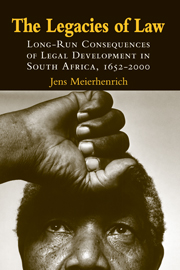Book contents
- Frontmatter
- Contents
- List of Figures
- List of Tables
- List of Cases
- Preface and Acknowledgments
- The Legacies of Law
- 1 Introduction
- PART I A THEORY OF LAW
- PART II A HISTORY OF LAW
- 4 Apartheid and the Law I
- 5 Apartheid and the Law II
- 6 Apartheid's Endgame and the Law I
- 7 Apartheid's Endgame and the Law II
- PART III A COMPARATIVE ANALYSIS
- 9 Conclusion
- Bibliography
- Index
4 - Apartheid and the Law I
Published online by Cambridge University Press: 18 December 2009
- Frontmatter
- Contents
- List of Figures
- List of Tables
- List of Cases
- Preface and Acknowledgments
- The Legacies of Law
- 1 Introduction
- PART I A THEORY OF LAW
- PART II A HISTORY OF LAW
- 4 Apartheid and the Law I
- 5 Apartheid and the Law II
- 6 Apartheid's Endgame and the Law I
- 7 Apartheid's Endgame and the Law II
- PART III A COMPARATIVE ANALYSIS
- 9 Conclusion
- Bibliography
- Index
Summary
To understand apartheid's endgame, we first need to understand apartheid. As William Riker remarked, at “any point in institutional development, humans start with some pre-existing customs that influence new departures.” Following Riker, this chapter revisits the pre-history of apartheid's endgame. It investigates the institutional foundations of the apartheid state, with particular reference to legal norms and institutions. It analyzes state formation and state transformation, and its relationship to race, class, and nationalism in South Africa. The period under investigation stretches from colonial times to the reform of apartheid, from 1652 to the early 1980s. From this longitudinal perspective, the chapter reconstructs the evolution of legal norms and institutions, and explicates their effects, in the making of apartheid. It is concerned with the explanation of institutions. While the book takes the apartheid state as the object to be explained in the next two chapters (the dependent variable), the state will become the thing that does the explaining (the independent variable) in the following two chapters.
The discussion in this chapter is organized around critical junctures of state formation in South Africa. The discussion is episodic rather than comprehensive. It begins with a brief historical overview of South Africa's strong-state path to democracy. The chapter then returns to some crucial moments of state formation and transformation. It illustrates how, and why, Dutch-descended Afrikaners and British-descended English-speakers converged on the idea of a “racial state,” and what it took to turn this racial state into the apartheid state.
- Type
- Chapter
- Information
- The Legacies of LawLong-Run Consequences of Legal Development in South Africa, 1652–2000, pp. 83 - 111Publisher: Cambridge University PressPrint publication year: 2008



